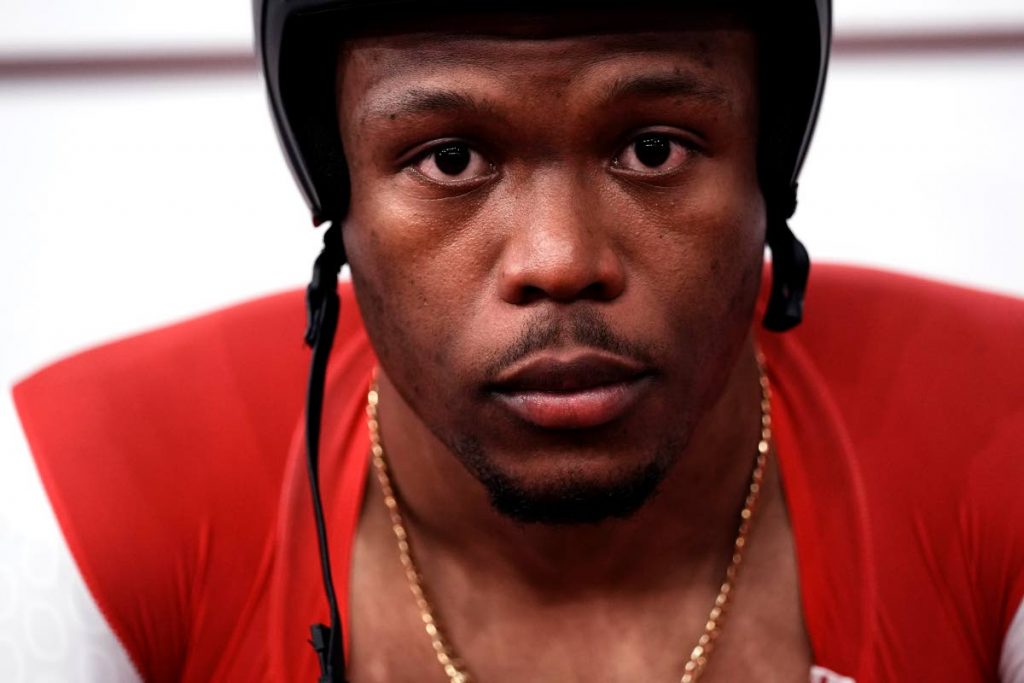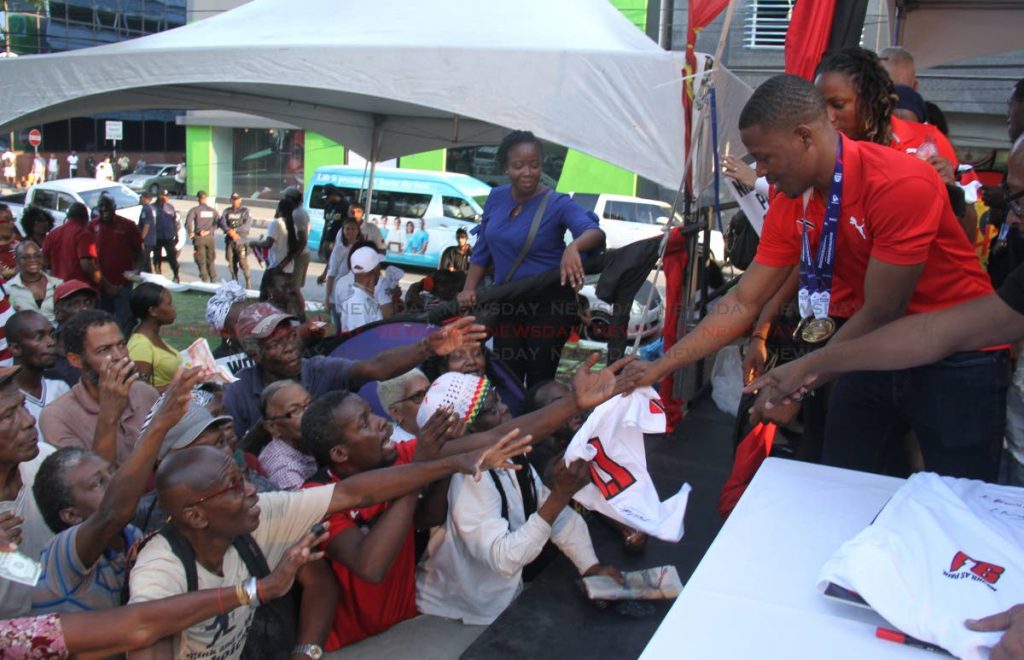Being a cycling world record holder is expensive

ATHLETES around the world dream of winning an Olympic gold medal.
However, this dream comes at a cost very few are able to cover from personal finances.
Talent can only get you so far. Being great– and staying at that elite level – is a million-dollar expense.
The gold medal at the 2020 Tokyo Olympics has been valued at around US$810, but what is the cost of an athlete working towards winning that medal.
Trinidad and Tobago ended the Tokyo Games without a medal for the first time since the 1992 Barcelona Games.
The majority have shifted focus to Paris 2024 as the challenging three-year qualification journey is set to begin.
In Tokyo, more than 20 world records were broken, including three in cycling.
TT cyclist Nicholas Paul, who finished sixth in the men's sprint and 12th in the keirin, had an impressive Olympic debut.
Paul's flying 200m world record, achieved in Bolivia in 2019, remains intact.
Trinidad and Tobago has a world record holder!
However, Paul, similar to a number of TT Olympians, remains unsponsored.

The 22 year old, with gold medals at CAC Games and Pan Am Games, is geared to take the next step.
What does it cost an elite athlete or a world record holder to maintain his/her global ranking and perform at a level worthy of investment by corporate entities?
In TT, there are a few elite athletes who are currently sponsored and/or receive endorsements.
However, the pandemic continues to have adverse effects on the global economy forcing organisations to cut back on spending.
But the disappointment expressed because TT did not earn a medal should show companies that there is value in investing heavily in the nation’s top performers.
Paul, Kwesi Browne (ninth in the Olympic keirin), and Olympic road cyclist debutant Teniel Campbell continue to fly the flag high in cycling, following in the footsteps of Njisane Phillip, still riding at a high level, who was fourth in the men's sprint at the London Games.
Some of the major costs for an athlete seeking Olympic qualification stem from participating in qualifier events, which are on foreign soil.
But training, elite coaching, supplements, physiotherapists, dieticians, equipment and other necessities also contribute to building a potential Olympic medallist.
For TT's cyclists, approximately $150,000 was spent on equipment for each athlete ahead of the Games.
Fortunately, the cost of spending the past nine months at the World Cycling Centre (WCC) in Switzerland by Paul and Browne was offset by the International Olympic Committee’s Olympic Solidarity.
The aim of Olympic Solidarity is to provide assistance to all National Olympic Committees (NOCs) for athlete development programmes, in particular those with the greatest needs for it.
Elite training costs elite money.
Paul and Browne returned to the WCC in October 2020 to fine-tune ahead of the Games under coach Craig McLean.

Aside from equipment, TT Cycling Federation president Rowena Williams said a certified coach costs about US$5,000 per month.
"You still have to get supplements, average at TT$2,500 monthly, a physiotherapist, a nutritionist/dietician. All these are necessary costs for an athlete to maintain their position and continuously improve.
“And we haven’t even spoken about travelling to qualifier competitions, accommodations and so on,” she said.
On their recent accomplishments, Williams is hopeful sponsors will come on board since the Olympics are usually used by corporations as a gauge for potential athlete investment.
Paul and Browne’s performances on the big stage are expected to attract both local and international interest.
“You have to remember that Nicholas would have had to perform at the highest level. Other athletes would have gone through Olympics before and would have built their name.
“Nicholas has now built his name so now is the time that people would want to come on board. It’s not that they didn’t before. He is now being seen and had to prove himself. All these guys who gained sponsorship before have been Olympians prior, so that’s the difference.”
Prior to Phillip’s exciting showing at the 2012 Games, he was able to secure sponsorship from Directv.
At that time, Phillip was travelling the globe and dominating the sprint circuit in multiple countries. He built a credible name for himself on the international circuit.
Phillip gave an estimate on the cost to become an Olympian.
“I would say about US$45,000 per year for Olympic qualifiers for a solo athlete," he said.
"You have to do massage therapy, bike equipment and change tyres. They’re expensive, and you use a couple for the year.”
Phillip added that international travel amounts to the majority of costs, having competed in Azerbaijan and China, among a host of other distant lands to seek qualification back then. Living costs, he said, cannot be forgotten.
“Getting points to qualify is a long and expensive process. It’s a lot of funding that’s needed for the athlete to also live as well. Being able to live as a professional athlete, having a proper diet; all these things come into play and carry a hefty cost. When these things add up, it’s a lot.”

Phillip, a multiple national and Pan American sprint champion, agreed that funding remains an issue.
“This time around with covid19, people don’t want to spend money on athletes. The cyclists are going to continue flying the flag but it’s less than three years to Paris. It’s good for them to get that support early, reset and know (where) their minds are at. Any help is tremendous right now.”
Williams said an unsponsored athlete is less focused on their goals.
“If they’re comfortable and know the funds are there, then they can place sole emphasis on riding the bike and training hard. As a human being, whilst you might try to not think about it, it’s there in the back of your mind all the time,” she said.
As it stands, the approximate cost for one cyclist to utilise the WCC for one month is around 9,000 Swiss francs. This amounts to TT$66,060; a distant reach for a cash-strapped TTCF.
This covers accommodation, meals, supervision of equipment, infrastructure, medical, monitoring, travel and other associated elements.
Williams continued, “The federation cannot afford that for one cyclist. If we pay that for one cyclist, there will be no money to run the sport. Development programmes, among others, have to be held, so we can’t invest everything in just one cyclist. It wouldn’t be practical.”
But since her return to helm of cycling in February, the National Cycling Velodrome in Couva has been one of her main focal points for development.
The world-class facility has engaged direct interest from the sport’s global governing body, International Cycling Union, and is geared towards helping offset a hefty chunk of TT’s Olympic athlete preparations.
To date, it has not yet been put to its full use. But major developments are currently on track towards its utilisation.


Comments
"Being a cycling world record holder is expensive"